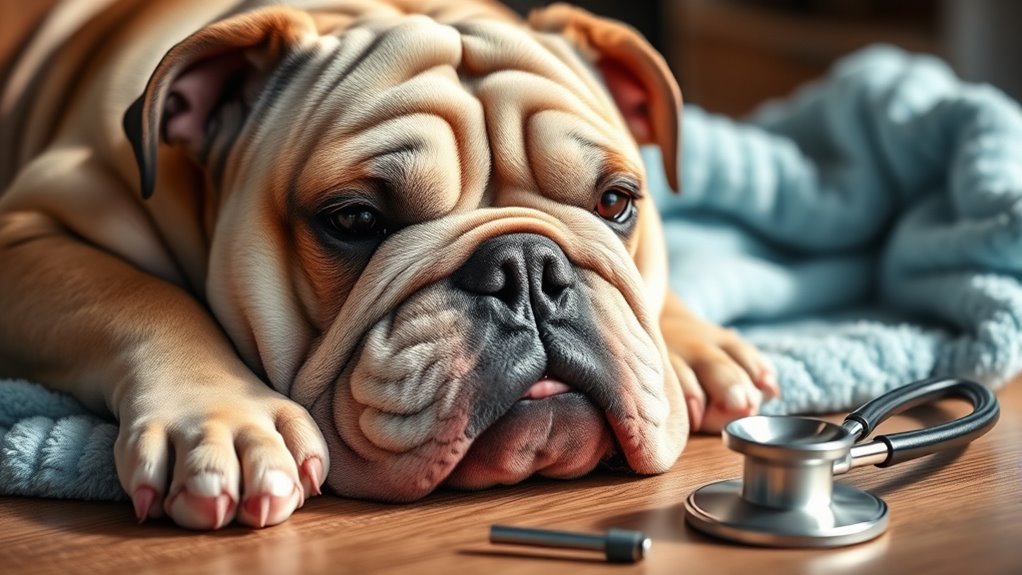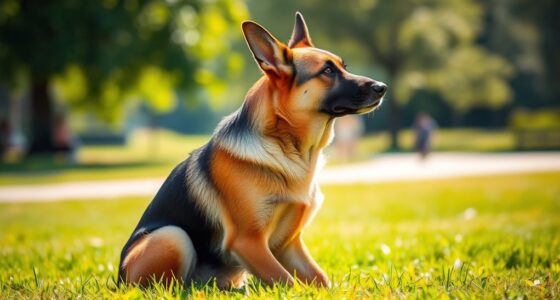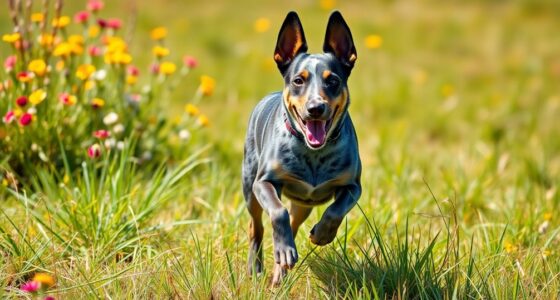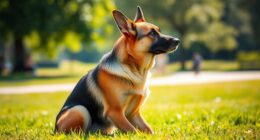Bulldogs are prone to breathing problems due to their short noses and skin infections from facial folds. To manage these issues, keep your dog in cool, ventilated areas, monitor their breathing, and maintain a healthy weight. Regular grooming and cleaning of their wrinkles help prevent infections, while consulting your vet can reveal options like surgery if needed. Stay attentive to their signs and care routines—more tips to help your bulldog stay healthy lie ahead.
Key Takeaways
- Bulldogs are prone to breathing issues due to their brachycephalic skull structure; regular vet checks help manage this.
- Daily inspection and cleaning of facial folds prevent skin infections caused by trapped moisture and bacteria.
- Maintaining a healthy weight reduces pressure on airways, alleviating breathing difficulties.
- Recognizing early signs of respiratory or skin problems allows prompt intervention and treatment.
- Keeping Bulldogs in cool, well-ventilated environments minimizes heat-related breathing struggles.

Bulldogs are beloved for their distinctive appearance and charming personalities, but their unique physical traits also make them prone to various health issues. As a responsible owner, understanding these concerns can help you provide the best care possible. Two common problems you’ll likely encounter are breathing difficulties and skin infections. Recognizing early signs and knowing how to address these issues is essential for keeping your bulldog healthy and comfortable.
Breathing difficulties are especially common in bulldogs due to their brachycephalic skull structure, which results in a shortened nose and obstructed airways. You might notice your dog breathing heavily, making loud snorting sounds, or struggling during physical activity. These symptoms can worsen in hot or humid weather, so it’s crucial to monitor your dog’s activity levels and environment. To help ease their breathing, keep them in cool, well-ventilated areas and avoid strenuous exercise during the hottest parts of the day. If breathing problems seem severe or suddenly worsen, consult your veterinarian immediately. They may recommend procedures like a soft palate resection or other surgeries to improve airflow, but prevention through regular check-ups is the best approach. Maintaining a healthy weight also reduces airway pressure and eases breathing.
Skin infections are another common concern, especially since bulldogs have folds and wrinkles that trap moisture, dirt, and bacteria. These areas are prone to irritation, redness, and foul odors if not cleaned regularly. You should inspect your dog’s skin daily, paying close attention to the folds around their face, ears, and paws. Keep these areas dry and clean using gentle wipes or a damp cloth, and dry them thoroughly afterward. Regular grooming helps prevent the build-up of debris and reduces the risk of skin infections. If you notice redness, swelling, or a bad smell, it’s a sign that your dog might have an infection or irritation that needs veterinary attention. Your vet can recommend medicated wipes, topical creams, or antibiotics if necessary. Preventative measures like trimming excess hair around folds and keeping your dog’s environment clean can greatly reduce infection risks. Additionally, understanding how sound vibrations can influence cellular health may offer innovative approaches to skin care and healing for your pet.
Frequently Asked Questions
How Often Should I Schedule Vet Visits for My Bulldog?
You should schedule vet visits for your bulldog at least once a year. During these visits, make certain they receive routine dental care to prevent dental issues and discuss parasite prevention to keep them healthy. If your bulldog has underlying health problems or shows signs of discomfort, consider more frequent check-ups. Regular vet visits help catch potential problems early, keeping your bulldog happy and healthy for years to come.
Are There Specific Exercise Routines Suitable for Bulldogs?
You should tailor exercise routines to your bulldog’s needs by incorporating exercise modifications like short, gentle walks and indoor activities. Avoid strenuous activities that can strain their breathing or joints. Keep sessions brief and consistent, focusing on low-impact options such as interactive toys or supervised play indoors. This approach helps maintain their fitness while preventing overexertion, ensuring your bulldog stays healthy and happy.
What Are the Signs of Dental Issues in Bulldogs?
You’ll notice signs of dental issues in your bulldog if they show oral pain, such as pawing at their mouth, drooling excessively, or avoiding hard foods. Bad breath and visible tartar buildup are common indicators as well. Regular dental cleaning helps prevent these problems, but if you see bleeding gums or swelling, consult your vet promptly. Monitoring these signs guarantees your bulldog stays comfortable and healthy.
How Can I Prevent Obesity in My Bulldog?
Think of your bulldog like a tiny, powerful engine that needs the right fuel. To prevent obesity, focus on nutrition planning and weight management strategies. Feed measured portions, choose healthy, low-calorie treats, and avoid table scraps. Regular exercise also helps burn excess calories. You might remember that even small changes, like daily walks, can keep your pup healthy and energetic, ensuring they stay fit and happy for years to come.
Are There Breed-Specific Vaccinations Recommended for Bulldogs?
You should consult your vet about breed-specific vaccines for your bulldog, as they can recommend the best options to boost your dog’s immunity. While standard vaccinations cover common diseases, breed-specific vaccines may target particular health issues prevalent in bulldogs. Ensuring your bulldog receives the appropriate vaccines helps maintain your dog’s breed-specific immunity, reducing the risk of illness and keeping your furry friend healthy and happy.
Conclusion
While bulldogs may face some gentle hurdles along their journey, with attentive care and loving understanding, you can help guarantee their days are filled with comfort and joy. Embrace their unique needs as part of their charming character, and you’ll find rewarding moments that outweigh the small challenges. Remember, your commitment to their well-being nurtures a bond more precious than words, turning every shared breath into a quiet symphony of devotion and trust.










